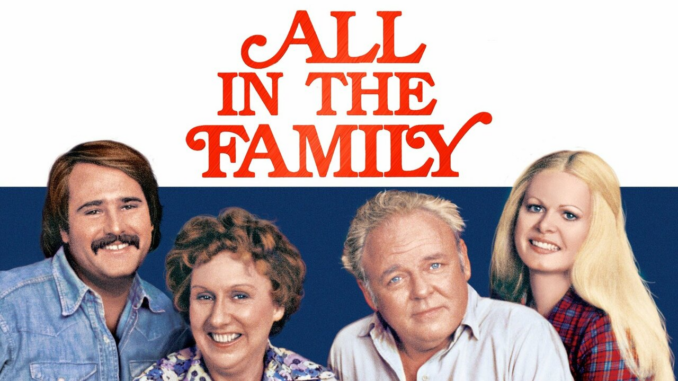
Introduction: Breaking New Ground in Television
When All in the Family first aired in 1971, it was a cultural earthquake. Unlike anything that had come before it, the show changed the landscape of television comedy forever. At a time when TV sitcoms were dominated by wholesome, idealized depictions of family life, All in the Family dared to challenge social norms, pushing boundaries with its unapologetic exploration of controversial topics like racism, sexism, and political divides. But it wasn’t just about shock value—it was about addressing uncomfortable truths in a way that made people laugh, think, and even question their own beliefs. This was a sitcom with a conscience, and its impact on television, and society, can still be felt today.
The Boldness of the Show: Addressing Controversy Head-On
What made All in the Family revolutionary was its approach to storytelling. The show’s central character, Archie Bunker (played by Carroll O’Connor), was a working-class man with deeply ingrained prejudices and conservative views. This was the antithesis of what viewers had come to expect from sitcom fathers—gentle, wise, and lovable. Archie, in contrast, was outspoken, narrow-minded, and often offensive. He clashed with his liberal son-in-law Mike “Meathead” Stivic, whose progressive views were at odds with Archie’s traditionalism. This clash of generations and ideologies became the heart of the show’s humor, as Archie’s outdated views were challenged by those around him. The show didn’t shy away from portraying these harsh differences, instead highlighting them with humor and wit.
All in the Family wasn’t just about comedy—it was a vehicle for social commentary. The show tackled topics that were often avoided on mainstream television, including racial tension, sexual inequality, war, and poverty. By presenting these issues through the lens of comedy, All in the Family invited viewers to engage with them in a way that felt both relatable and confronting. The humor, sharp as it was, wasn’t just for laughs—it forced audiences to think critically about the world around them.
A Show That Reflected the Changing Times
The 1970s were a time of political and social upheaval in America. The Civil Rights Movement had gained significant ground, the feminist movement was on the rise, and the Vietnam War was deeply divisive. All in the Family was uniquely positioned to tap into these changes, using humor to reflect the challenges of the times. The characters represented various aspects of American society—Archie as the staunch, working-class conservative, Mike and Gloria as the progressive young couple, and Edith as the kind-hearted, but somewhat naive, traditional wife. Through these characters, the show explored how different people from different backgrounds interacted with the rapidly changing cultural and political landscape.
The Lasting Legacy of All in the Family
The cultural impact of All in the Family cannot be overstated. It was the first TV show to truly capture the complexity of American life in all its contradictions. The show broke taboos, brought difficult subjects into the mainstream, and reshaped what was possible in TV comedy. It paved the way for later sitcoms like The Simpsons, Family Guy, and The Office, which also mixed humor with sharp social commentary. Even today, when we look back at All in the Family, we see how its influence lives on in the way modern TV tackles uncomfortable subjects.
Conclusion: A Show That Redefined Television
All in the Family was more than just a TV show—it was a cultural milestone that changed the way we think about comedy and television. It proved that sitcoms could be more than just entertainment—they could challenge societal norms, raise awareness about important issues, and spark meaningful conversations. The show’s fearless exploration of race, politics, class, and family dynamics made it one of the most influential sitcoms in television history, and its impact still resonates today.
